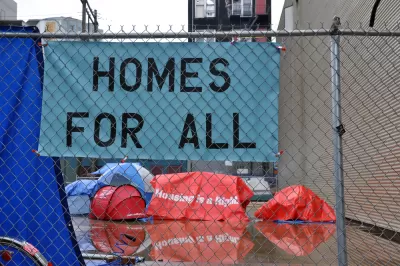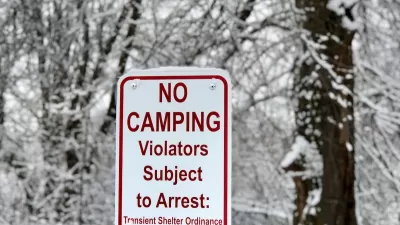Housing voucher recipients face a gauntlet of challenges when trying to find housing. Nonprofits are doing their best to streamline the process.

Ethan Ward describes the challenges plaguing the federal Section 8 housing voucher program, which provides rental assistance to low-income people but fails to reach many of those who need it most. According to Mark Vestal, co-author of "Making of a Crisis: The History of Homelessness in L.A.," a report from the UCLA Luskin Center for History and Policy, "About 50% of people who get vouchers can't find housing. Landlords can discriminate against voucher holders and they have complete discretion."
As neighborhoods gentrify, Vestal says, voucher recipients find more and more limited housing options. After experiencing difficulties using vouchers for various reasons, one Los Angeles nonprofit, the Homeless Outreach Program Integrated Care System (HOPICS), decided to try a new approach: because landlords often express concerns about potential damage to units rented by voucher recipients, HOPICS has started negotiating with landlords to manage buildings themselves—including maintenance and repairs. HOPICS director Veronica Lewis says she hopes the experiment can provide a scalable model for other housing nonprofits and calls for a 'damage mitigation fund' to aid organizations like hers in taking similar actions.
"Lewis said a shift in the way things are done is necessary to get people housed faster. Vestal said unhoused people are at least elevated in the eyes of those who have the power as being full fledged political subjects who have ideas about how they want to live and who they want to live," writes Ward.
FULL STORY: A Voucher Program May Help Homelessness... But Some Barriers Get In The Way

Study: Maui’s Plan to Convert Vacation Rentals to Long-Term Housing Could Cause Nearly $1 Billion Economic Loss
The plan would reduce visitor accommodation by 25,% resulting in 1,900 jobs lost.

Alabama: Trump Terminates Settlements for Black Communities Harmed By Raw Sewage
Trump deemed the landmark civil rights agreement “illegal DEI and environmental justice policy.”

Why Should We Subsidize Public Transportation?
Many public transit agencies face financial stress due to rising costs, declining fare revenue, and declining subsidies. Transit advocates must provide a strong business case for increasing public transit funding.

Paris Bike Boom Leads to Steep Drop in Air Pollution
The French city’s air quality has improved dramatically in the past 20 years, coinciding with a growth in cycling.

Why Housing Costs More to Build in California Than in Texas
Hard costs like labor and materials combined with ‘soft’ costs such as permitting make building in the San Francisco Bay Area almost three times as costly as in Texas cities.

San Diego County Sees a Rise in Urban Coyotes
San Diego County experiences a rise in urban coyotes, as sightings become prevalent throughout its urban neighbourhoods and surrounding areas.
Urban Design for Planners 1: Software Tools
This six-course series explores essential urban design concepts using open source software and equips planners with the tools they need to participate fully in the urban design process.
Planning for Universal Design
Learn the tools for implementing Universal Design in planning regulations.
Smith Gee Studio
Alamo Area Metropolitan Planning Organization
City of Santa Clarita
Institute for Housing and Urban Development Studies (IHS)
City of Grandview
Harvard GSD Executive Education
Toledo-Lucas County Plan Commissions
Salt Lake City
NYU Wagner Graduate School of Public Service





























